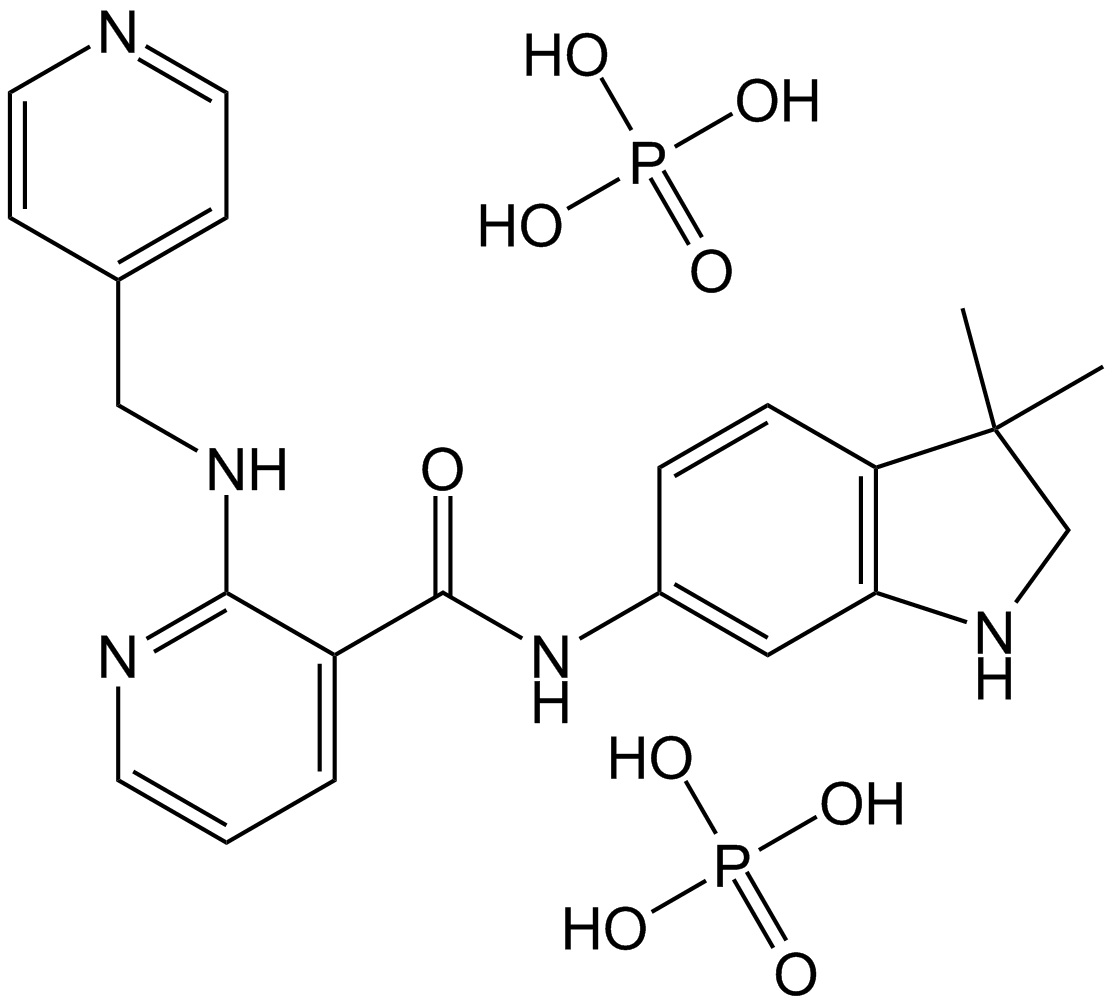Motesanib Diphosphate (AMG-706) (Synonyms: Motesanib) |
| Catalog No.GC11336 |
Motesanib Diphosphate (AMG-706) (AMG 706 Diphosphate) is a potent ATP-competitive inhibitor of VEGFR1/2/3 with IC50s of 2 nM/3 nM/6 nM, respectively, and has similar activity against Kit, and is approximately 10-fold more selective for VEGFR than PDGFR and Ret.
Products are for research use only. Not for human use. We do not sell to patients.

Cas No.: 857876-30-3
Sample solution is provided at 25 µL, 10mM.
Motesanib Diphosphate is a diphosphate form of motesanib. It is a potent ATP-competitive inhibitor of VEGFR1/2/3 with IC50 of 2 nM/3 nM/6 nM, respectively [1].
Vascular endothelial growth factor (VEGF) is an important signaling protein involved in both vasculogenesis (the formation of the circulatory system) and angiogenesis (the growth of blood vessels from pre-existing vasculature). Motesanib (AMG 706) is an orally administered small molecule belonging to angiokinase inhibitor class which acts as an antagonist of VEGF receptors, platelet-derived growth factor receptors, and stem cell factor receptors.
In vitro: Motesanib diphosphate has broad activity against the human VEGFR family, and displays >1000 selectivity against EGFR, Src, and p38 kinase. Motesanib Diphosphate significantly inhibits VEGF-induced cellular proliferation of HUVECs with an IC50 of 10 nM, while displaying little effect at bFGF-induced proliferation with an IC50 of >3,000 nM. Motesanib Diphosphate also potently inhibits PDGF-induced proliferation and SCF-induced c-kit phosphorylation with IC50 of 207 nM and 37 nM, respectively, but not effective against the EGF-induced EGFR phosphorylation and cell viability of A431 cells [1]. Althouth displaying little antiproliferative activity on cell growth of HUVECs alone, Motesanib diphosphate treatment significantly sensitizes the cells to fractionated radiation [2].
In vivo: Oral administration of AMG 706 potently inhibited VEGF-induced angiogenesis in the rat corneal model and induced regression of established A431 xenografts. AMG 706 was well tolerated and had no significant effects o AMG 706n body weight or on the general health of the animals. Histologic analysis of tumor xenografts from AMG 706–treated animals revealed an increase in endothelial apoptosis and a reduction in blood vessel area that preceded an increase in tumor cell apoptosis. In summary, AMG 706 is an orally bioavailable, well-tolerated multikinase inhibitor that is presently under clinical investigation for the treatment of human malignancies [1].
Clinical trial: Motesanib was originally investigated for effectiveness against advanced nonsquamous non-small-cell lung cancer (NSCLC), with Phase II trials indicating an effectiveness comparable to bevacizumab when they were both used in combination with paclitaxel/carboplatin. However a later and more detailed Phase III trial failed to show any benefit for the treatment of NSCLC. A second Phase III trial was started in 2012, which focused on patients from Asian backgrounds (performed on the bases of subgroup analysis) however this also failed to meet its primary endpoint. The drug has undergone a Phase II evaluation as first-line therapy for breast cancer however this study found no evidence to support further investigation. Phase II testing against persistent or recurrent ovarian, fallopian tube and primary peritoneal carcinomas was also unsuccessful. There have also been 2 separate Phase II clinical trials for thyroid cancer which have both shown promising results (http://en.wikipedia.org/wiki/Motesanib).
References:
[1] Polverino A, Coxon A, Starnes C, et al. AMG 706, an oral, multikinase inhibitor that selectively targets vascular endothelial growth factor, platelet-derived growth factor, and kit receptors, potently inhibits angiogenesis and induces regression in tumor xenografts. Cancer Res. 2006;66(17):8715-21.
[2] Kruser TJ1 Wheeler DL, Armstrong EA, Iida M, Kozak KR, van der Kogel AJ, Bussink J, Coxon A, Polverino A, Harari PM. Augmentation of radiation response by motesanib, a multikinase inhibitor that targets vascular endothelial growth factor receptors. Clin Cancer Res. 2010;16(14):3639-47.
Average Rating: 5 (Based on Reviews and 28 reference(s) in Google Scholar.)
GLPBIO products are for RESEARCH USE ONLY. Please make sure your review or question is research based.
Required fields are marked with *




















